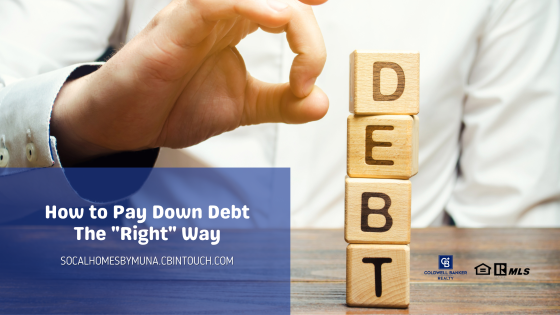
You want to buy an Inland Empire home. However, rising interest rates concern you. You need to get your credit in tip-top shape to receive the best mortgage rates available. A FICO score of 620 may get you approved for a loan, but an 800+ gets you the best rates. That can save you hundreds of dollars a month on your mortgage payment. One of the ways to boost your score is to pay down your debt. This may come as a shocker, though. Did you know that the way you pay down debt makes a difference in how quickly it affects your credit score?
How to Pay Down Debt the “Right” Way
Tackling your debt is always a good choice to make before you take on a home mortgage. Be that as it may, some ways prove more beneficial than others. First, you need to look at installment debt vs. revolving debt. Then, think about whether you want to work on high-interest accounts or your balances.
Installment vs. Revolving
It helps to know the difference between these two types of debt. Installment debt applies to loans for things like mortgages, automobiles, personal loans, etc. With these, you pay a specific amount of money each month for a set period of time. Balances on revolving accounts go up and down depending on what you charge or pay each month with no set time frame for paying it off. Most financial experts suggest you pay down debt on your revolving credit first. Then, tackle your installment loans. Revolving credit carries more weight on your credit score than installment loans. Therefore, paying revolving accounts down first brings your FICO score up faster.
High-Interest Accounts
You have two options when it comes time to pay down debt on your revolving accounts: work on the highest interest accounts first or work on paying off accounts with the lowest balances first. Most credit cards base their interest rates off the prime rate set by the Federal Reserve. So, with rates on the rise, it might behoove you to work on your credit cards with the highest interest first.
High Balance Accounts
Your other option to pay down your debt to your best advantage is to pay off the smaller balances first. Psychologically, a zero balance provides a sense of accomplishment. In turn, it helps motivate you to continue paying down your debt.
How to Pay Down Your Debt
Whichever method you choose, use these steps to pay off your balances. Look over your budget. Figure out how much you can afford to put towards paying off the debt on the first account you choose. Then, only pay the minimum due on your other accounts. Once you pay off the first account, choose your next account. Take that same amount you paid each month for that first account and then add the minimum on top of it. Continue doing this until all of your revolving debt is gone. So, let’s say that you pay $200 per month on your first card. Your minimum payment on your next card is $49 per month. Once you pay the first card off, you start paying $249 per month towards the second card. If you have more accounts, you do the same thing. Simply roll the amount you were paying on the last card on top of the minimum you pay on the next account. This gets is paid off faster without you paying more out of pocket. Before you know it, all accounts show a zero balance!
If you have a card that allows you to do an interest-free balance transfer for a certain amount of time, this may also provide a quicker (and cheaper) alternative to paying down your debt. But you need to make sure that you pay that debt off in the zero-interest timeframe or else you will be hit with a huge interest rate at the end of it. Let’s say that a card offers 0% interest on balance transfers for 12 months. Take the total amount you transfer and divide it by 12. For example, you have $4800 total debt mixed among three revolving accounts. If you transfer those balances into one account with 0% interest and pay $400 per month (plus whatever transfer fees are due), all of your debt is paid off in a year with no further interest due.
Paying down your revolving debt helps boost your FICO score the fastest. A higher credit score opens you up to more possibilities for mortgage loans. And that is always a good thing.
Muna Dionne, your Inland Empire specialist with Coldwell Banker Realty


 Facebook
Facebook
 X
X
 Pinterest
Pinterest
 Copy Link
Copy Link